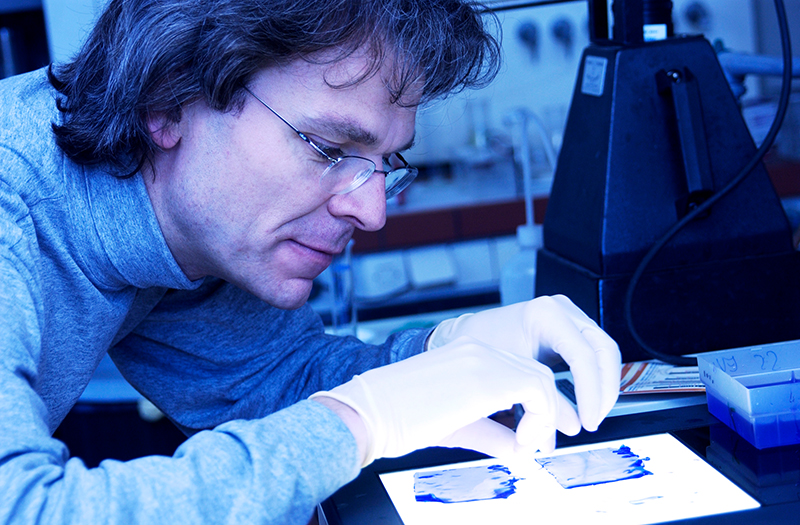All over the world intensive research is under way to develop a treatment to combat SARS-CoV-2, the cause of Covid-19. The University of Graz is now launching a fundraising project to which anyone can contribute, with the aim of accelerating an unconventional therapeutic approach being pursued here. The idea is to find an effective way to prevent the virus with a novel drug from entering human cells via the surrounding extracellular matrix.
>> Click here to visit the project website, where you can make a donation: https://fundraising.uni-graz.at/de/stop-covid-19/
Project leader (principal investigator) Andreas Kungl from the Institute of Pharmaceutical Sciences explains: “Our cells are surrounded by a layer of complex sugar structures within a matrix, which form a frontline barrier to defend cells against anything trying to enter the body. However, certain intruders – tumour cells, for example, but also viruses such as SARS-CoV-2 – are able to take advantage of this barrier. For this purpose, the Covid-19 virus docks to these sugar structures in the first place, before he enters lung cells via a typical protein receptor. At exactly this first point the new drug should prevent contact and thus inhibit penetration of the target tissue.
Sugar as a game changer
Special sugar molecule receptors play a key role in this process. “Due to their complex chemical structure they have so far not been extensively studied, and they have hardly been discussed at all in the context of developing a medication against Covid-19,” says Kungl. In the future, it will be vital to have a wide range of drugs available, the researcher explains: “This means we need to identify many different suitable molecular target structures on which pharmaceutical substances can act. Focusing on the sugar molecule receptors is an entirely new and pioneering approach, which has the potential to make a crucial impact on combating future diseases caused by various viruses.”
Supporting research in Graz
Andreas Kungl and his research group have been working for a long time on identifying possible targets for their novel biopharmaceuticals which, amongst other indications, could prevent also metastases formation, for example in lung, prostate and colon cancer. Kurt Zatloukal from the Diagnostic & Research Institute of Pathology at the Medical University of Graz is also involved in the current project. Together the team hopes to make a substance available within the next 18 months to treat severely ill Covid-19 patients. “The fundraising initiative is designed to generate financial support for this important research, and thus to accelerate it,” explains Peter Riedler, Vice-Rector for Financial Affairs, Resources and Location Development.
At the same time, there are other research projects running in Graz that are also looking for ways to treat coronavirus infections. The University of Graz start-up Innophore, for example, is currently collaborating with Google and Harvard University to test around two billion potential drug candidates to combat SARS-CoV-2.
